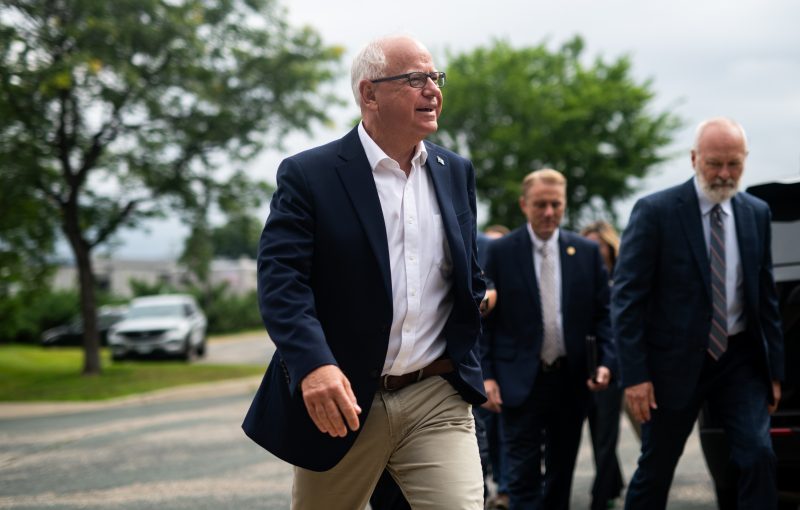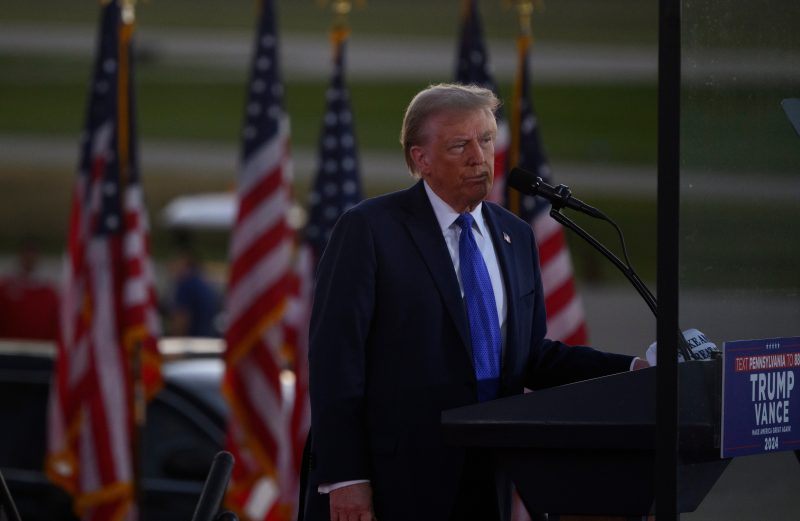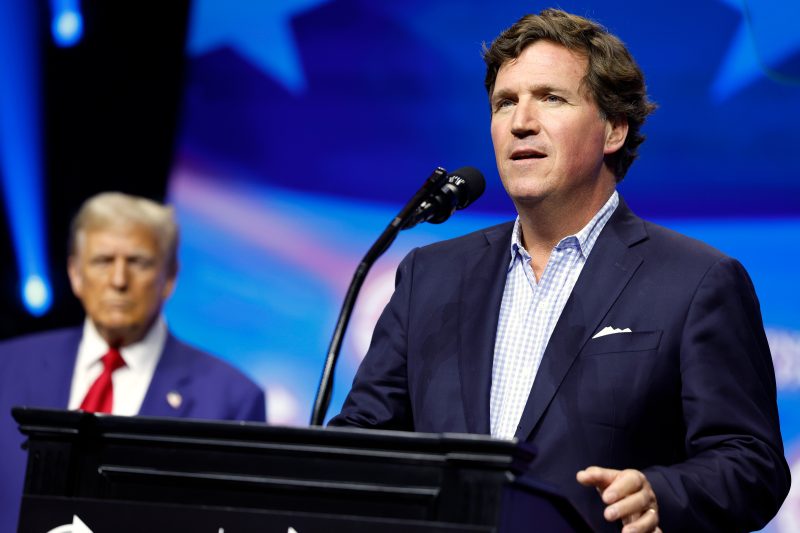Tim Walz’s journey from high school football coach to VP candidate

Some 20 years ago, a lawyer named Kamala Harris won her first political race, becoming the first Black and South Asian woman elected district attorney of San Francisco in 2003 after campaigning on criminal justice policy changes, including opposition to the death penalty.
Halfway across the country, in Mankato, Minn., a high school teacher named Tim Walz had a lower-profile but no less fraught daily mandate: overseeing his social studies classes, coaching the football team and occasionally wrangling the lunchroom.
The unlikely convergence of Harris’s and Walz’s paths would take place more than two decades later, with the news Tuesday that Harris had selected Walz, now the governor of Minnesota, to be her running mate.
The much-anticipated decision creates a ticket with two candidates from strikingly different backgrounds: Harris, 59, is Black and Indian American and spent much of her career as an attorney and prosecutor in deep-blue California. Meanwhile, Walz, 60, is a veteran and hunter who has spent most of his life in rural Nebraska and Minnesota — and is the first Democratic vice-presidential pick since 1964 who did not go to law school.
Walz’s foray into politics came later in life: Born and raised in West Point, Neb., a small rural town, after high school he enlisted in the Army National Guard, where he would serve for the next 24 years. After losing his father to lung cancer at age 19 — which he would later say shaped his views on health care — Walz enrolled in Chadron State College in Nebraska and graduated with a teaching degree in 1989.
Walz met his future wife, Gwen, while teaching after college, and they moved in 1996 to her home state of Minnesota. He would stay at Mankato West High School as a teacher and football coach for the next decade or so, until he decided to run for public office — reportedly motivated to do so after he and some students were denied entry to a 2004 George W. Bush campaign event because organizers found out they were Democrats.
In 2006, Walz won the race to represent Minnesota’s 1st Congressional District, flipping a Republican seat in a rural part of the state.
In Congress, Walz positioned himself as a rare moderate Democrat who was a strong supporter of gun rights, earning him an A rating from the National Rifle Association. In his freshman year, he praised then-President George W. Bush for proposing to expand the Army National Guard forces, but also criticized Bush for his lack of a clear mission in the Iraq War and opposed his plan to send additional U.S. troops to Iraq.
“As the mission in Iraq has evolved from [finding] weapons of mass destruction to forming a democratic government to now just stabilizing to the point where the Iraqis can take over, the president has consistently been wrong on the plan on this and … I have deep concerns in that because the devil is in the details,” Walz said in 2007. “Giving us what the end may look like is one thing but actually delivering those — we need some accountability on that.”
Walz would win reelection to his seat five more times before leaving the House to run for governor. In the 2018 gubernatorial race, Walz defeated his Republican opponent by more than 10 percentage points.
By then, Walz had shifted to the left on several key issues, including on guns. After the February 2018 shooting at Marjory Stoneman Douglas High School in Parkland, Fla., Walz said his then-17-year-old daughter, Hope, urged him to do more to prevent gun violence. On the campaign trail as he ran for governor that year, Walz said he in turn donated all the money he had ever taken from the NRA to charity and publicly pushed for background checks and eliminating reciprocal-carry agreements between states.
“I know basic gun safety isn’t a threat to my rights. It’s about keeping our kids safe,” Walz said last month about his evolution on the issue. “I had an A rating from the NRA. Now I get straight F’s. And I sleep just fine.”
Hope, now 23, has since made frequent appearances in videos posted to Walz’s social media accounts. In a recent MSNBC interview on Harris’s ascent, Walz said his daughter had told him it was “a brat summer” and he joked he didn’t know what she meant “but I’m sure it’s a good thing” — a reference to pop singer Charli XCX’s album that Democrats have embraced as they boost Harris to young voters.
In 2022, Walz handily won reelection to his second term while Democrats also flipped the state Senate, securing a trifecta for Democrats in St. Paul that has allowed them to pass liberal priorities. Democrats under Walz’s governorship have enshrined the right to abortion, allowed undocumented immigrants to obtain a driver’s license, expanded background checks for gun transfers, legalized recreational marijuana and offered protections for people seeking or providing gender-affirming health care.
Walz also signed an executive order that removes the college degree requirement for 75 percent of Minnesota’s state jobs, a move that garnered bipartisan support and several states have also adopted. Democrats have also offered funding for free meals at schools and free college tuition for students from low-income families in Minnesota.
Asked in a July 28 interview with CNN if such policies would be fodder for conservative attacks, Walz responded sarcastically: “What a monster. Kids are eating and having full bellies, so they can go learn, and women are making their own health-care decisions.”
He later added: “So, if that’s where they want to label me, I’m more than happy to take the [liberal] label.”
In the days after President Biden announced he would no longer seek reelection, Walz made numerous appearances on television, and his folksy demeanor and willingness to use plain language to criticize former president Donald Trump and Sen. JD Vance (R-Ohio) helped catapult him onto Harris’s vice-presidential shortlist. In interviews, Walz cast Trump and Vance as not just a threat to democracy but, simply, “weird,” an attack that quickly caught on for Democrats and that struck a nerve for Republicans.
“Who’s asking for this crazy stuff? Who’s asking to raise the price of insulin? Who’s asking to get rid of birth control? … Who’s sitting in a bar in Racine, Wisconsin, saying, ‘You know what we really need? We need to ban “Animal Farm.”’ Nobody is!” Walz told MSNBC last month, later adding: “Yes, they’re weird. They prove that every day. It’s an observation.”
Walz, formerly a little-known Midwestern governor, now faces the urgent task of introducing himself to the country with only about three months until Election Day. Harris will hold her first rally with Walz on Tuesday in Philadelphia, the first stop in a four-day tour of battleground states.
For Walz, the timing will coincide with the “excitement in the air” that the start of a new school year brings, he said in a video posted Wednesday.
“As a football coach, we’re back on offense,” Walz said, referring to Democratic optimism. “Vice President Harris is bringing the energy, making sure she’s going to be there to protect the democracy and get folks fired up, making sure we’re protecting reproductive rights, working for the middle class, and bringing back some joy to our politics — so get out there, feel the excitement, get engaged.’




